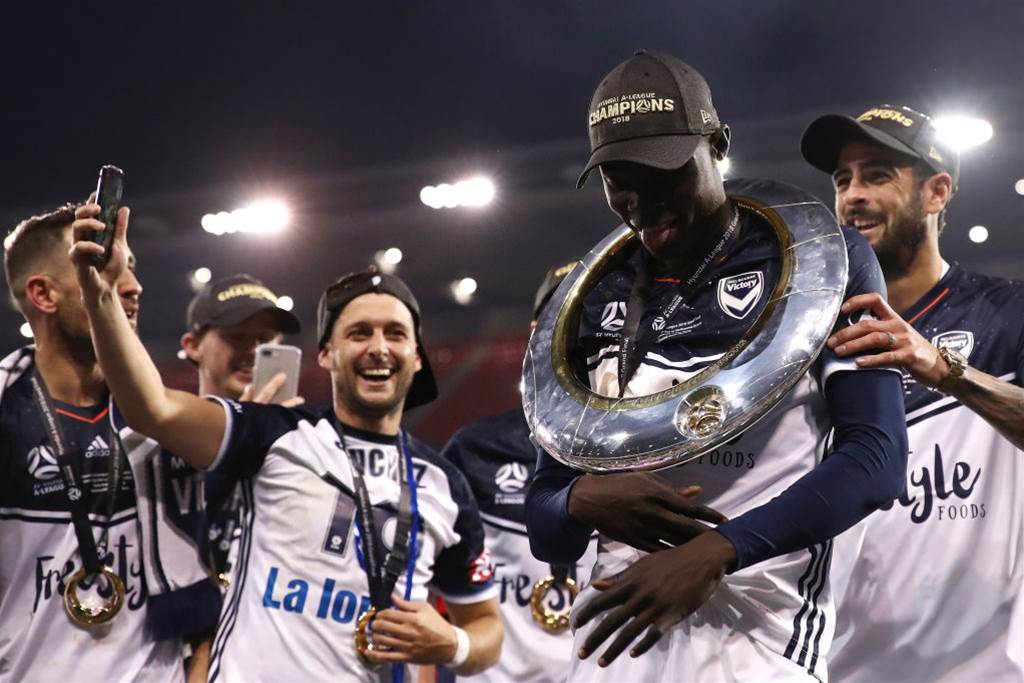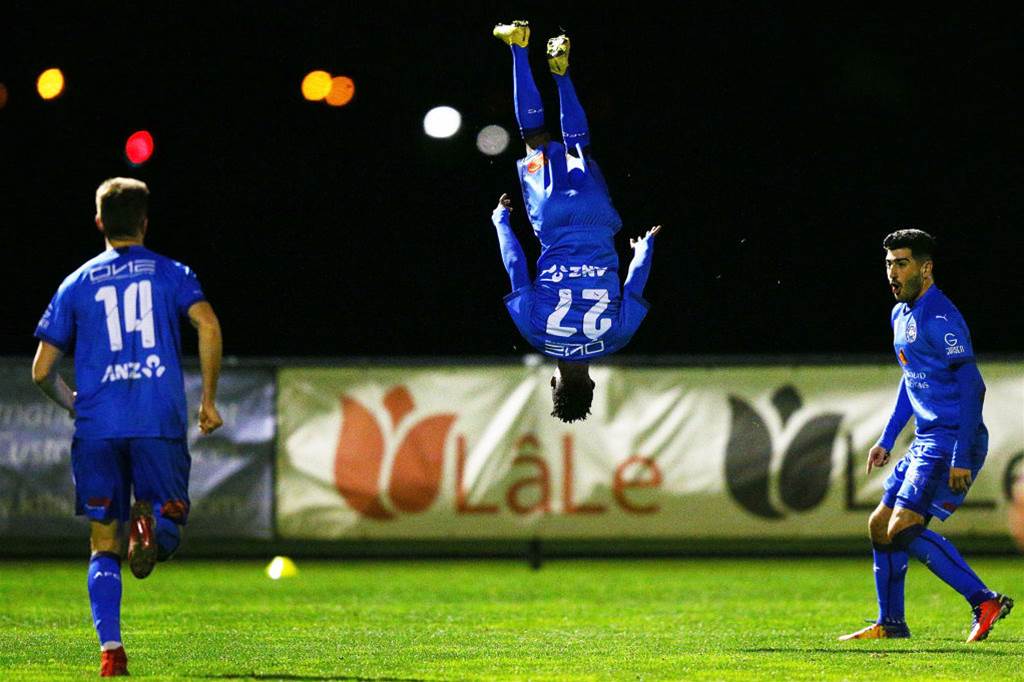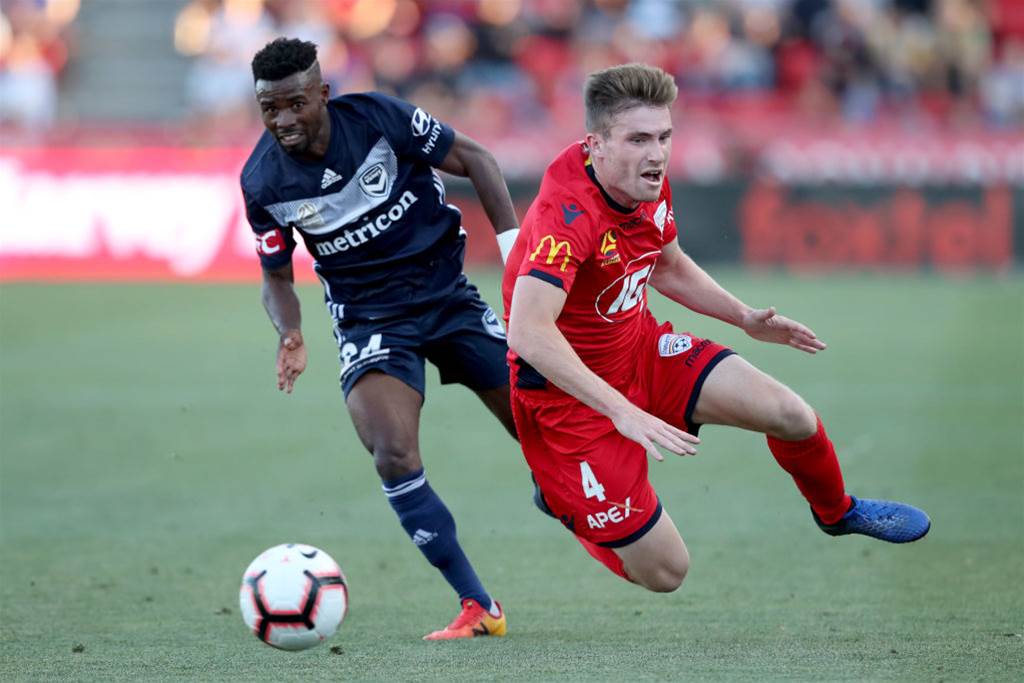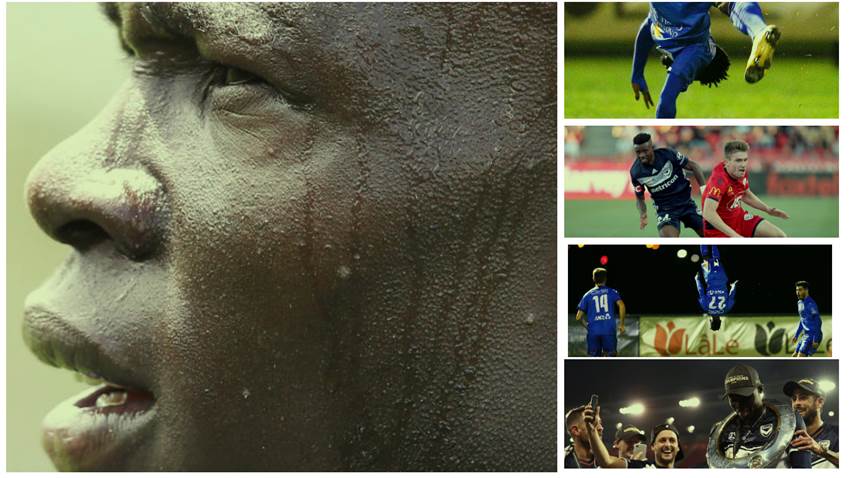Voluntarily covering the NPL could feel like pulling teeth, but pain’s merely a matter of perspective.
It’s a torrential night in Avondale, or maybe it was Pascoe Vale…each sodden council ground, dodgy carpark and greasy tuckshop fades effortlessly into the next.
The rain is seeping through the thin nylon in my Heidelberg United jacket and the zipper’s stuck, leaving the upper half of my soaking t-shirt exposed to an icy gale.
It’s Sunday night, I’m 20-years-old and I could be with friends, or better yet home asleep, but instead I’m spinning terribly-written match reports for at-best 20 readers, in the vain hope that it will translate into a career as a football journalist.
For a moment I awkwardly pity myself, consider packing it all in and travelling home.
But then I think of two of my most recent interviews; a swaggering Heidelberg striker called Kenny Athiu and a much slighter, yet equally striking Melbourne Knights forward, Elvis Kamsoba.
Two refugees who – while I was enjoying an Australian suburbanite upbringing – grew up in abject poverty, the collateral damage of decades of civil war.
Two people who tonight, while I was complaining about a jacket and a three-hour commute, were relishing they had a chance to pursue their dreams.
Two footballers who, three years later, now star together for A-League Champions Melbourne Victory.

“I still aim to be a professional footballer,” a then 23-year-old Athiu told me in 2016.
While he had only recently broken into semi-professional football after a long-term injury to fellow Heidelberg striker (now also A-League forward) Kaine Sheppard, Athiu already dressed like a celebrity and carried himself with enormous confidence, not least due to his baulking 6’7 frame.
“I’ve played football since I was six and it prevented me from losing focus,” he continued.
“In South Sudan, there wasn’t much and we didn’t have much. You would always see people stealing or wasting their lives.
“You just go to school and it was easy to get lost.”
Around 1,300 kilometres south of the Jonglei region, where Athiu was born, is the tiny African nation of Burundi - the birthplace of his Victory teammate, Elvis Kamsoba.
The distinctions between the pair are stark but complement each other perfectly: Athiu is more than a foot taller, while Kamsoba has a contrastingly quiet, occasionally stuttering disposition.
On the pitch, however, the Burundian - famed for his extravagant celebrations - quickly becomes the exuberant winger to Athiu’s imposing centre-forward, the Ronaldinho to his Ronaldo.
Despite their divergent personalities, their stories follow a similarly inspiring narrative.
“I came to Australia from a Tanzanian refugee camp and I’ve been here for the last nine years,” Kamsoba said.
“I was 12-years-old when I arrived in South Australia and started playing amateur football. I got into the Adelaide United youth setup a few times, first time at about 14-15.
“But things didn’t go so well, there were a lot of players and I was small and young. The coach told me ‘Go away, play some more first team games and I’ll get you when you’re ready.’
“So eventually I went back but the first-team coach had left. I came down and trialled with Melbourne City for a week, then Adelaide United called me and said they wanted me back.
“Then things didn’t go well again.”
Kamsoba was born into the aftermath of one of the world’s most notorious genocides, and after fleeing Burundi as an infant, spent the next eleven years in a Tanzanian refugee camp.
Like Athiu, opportunities had never come easily to Kamsoba. But after learning to play football using condoms filled with clothes, persistence became a natural and necessary virtue.
When we spoke, both footballers were training after work and playing matches on their weekends. While Athiu was living nearby the rustic terraces overlooking Heidelberg’s Olympic Park, Kamsoba’s uncle was driving him to Knights Stadium from Dandenong for each training session - a roughly two-hour commute.

Humility was a key concept for both – “to be honest, I like to think of myself as a very humble guy” – Athiu told me early in our conversation. Kamsoba was equally focused on selflessness – “every game I try to help the defender,” he beamed, showcasing a slightly rare attribute in the dog-eat-dog world of NPL football.
Both footballers believed it stemmed from the sacrifices their families had made so they could make it as professionals. Here, standing on a decrepit suburban pitch, was the only place I could truly relate to their story. While any conceited challenges I faced in becoming a football writer are non-existent in comparison to Athiu and Kamsoba’s, I too would have stood no chance were it not for the tireless, selfless help of my family.
Would anyone?
“I don’t feel like I made sacrifices, but I feel like my parents sacrificed a lot,” Athiu told me. “Leaving home to move to Australia, they left a lot of family to bring us to a better environment and give us better opportunities.
“Growing up they had to be on me at certain times, make sure I was eating right and not getting in trouble. They made a lot of sacrifices,” he repeated earnestly.
“I always look up to them for answers. Whenever I feel like I need to know something I go to them.”
In a country that was occasionally hostile and often confusing, football was the olive branch Australia offered. The pair were dedicating their lives to the beautiful game and it was only just beginning to give back.
“Football has helped me,” Athiu continued. “Through football you can get to know someone in a different way. You can see someone across the street and just go over and say ‘Hi’, but you can’t really know each other that well.
“It’s helped me adapt to knowing where everybody comes from, to understand people better.
“(South Sudanese Australians) have faced a lot of challenges. On television you always see negative things about the South Sudanese community. I know a lot of it isn’t true, but it’s hard if you’re new to the country and people are always saying negative things about you - you think that they hate you.
“But that’s the media that plays its role, and it’s not really as bad as it may look.”
Now, three years later, while the challenges that refugees face settling into Australia remain equally pronounced, the duo’s own positions have changed immeasurably.
Athiu, who earned the moniker King Kenny for his heroic exploits at Heidelberg, and the aptly named Elvis Kamsoba, coined after the King of Rock ‘n’ Roll himself, are not only fully professional, but two of the most exciting prospects at one of Australia’s most exciting clubs.

Their newfound status sees them share a dressing room with a bona fide superstar in Keisuke Honda, and will likely take them across Asia next month, as Victory kick-off their 2019 Asian Champions League campaign.
At 26 and 22-years-old respectively, they trekked the most arduous route to this stage. You’d be mad to say they couldn’t make it all the way.
“I never doubted my ability, I just had to work and wait for my opportunity,” Athiu said.
“As a soccer player you always want to push yourself to go as far as you can. I’d love to go to that next level and see how I can compete.
“South Sudan is the country I was born and raised in and I would obviously love to represent them in the future. Just the feeling of representing your country, you know?”
Exactly how far the pair will progress is unclear, but what’s certain is that they’ll continue to inspire regardless. And, as with everything they accomplish, it will be earned, not given.
"I'd be taking too much credit if I tell you I allowed sentiment to give him his debut,” Kevin Muscat said after Kamsoba’s debut this month.
“That only came into my thinking as an afterthought. He's earned the opportunity, it's just as simple as that.”
Related Articles
.jpeg&h=172&w=306&c=1&s=1)
Langerak to bolster Victory's ALM title bid in January

Socceroo-in-waiting seals Championship deal













